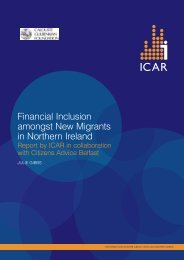Uncovered: assessing media and communications needs ... - ICAR
Uncovered: assessing media and communications needs ... - ICAR
Uncovered: assessing media and communications needs ... - ICAR
- No tags were found...
Create successful ePaper yourself
Turn your PDF publications into a flip-book with our unique Google optimized e-Paper software.
3.20 What courses?Signifi cant interest was expressed for many of the potential training topics, the most popular being‘how to market your organisation’, ‘awareness-raising’ <strong>and</strong> ‘designing electronic newsletters’ (thiswas the case for all groups <strong>and</strong> they are not therefore detailed in the following paragraph). The leastpopular topics are ‘daytime TV <strong>and</strong> soaps’ <strong>and</strong> ‘proofreading’. The fi ndings cohere with the emphasisorganisations place on external <strong>communications</strong>.There appear to be some differences in the <strong>needs</strong> of specifi c organisation types. Refugee <strong>and</strong> migrantworker groups are more likely to see the need for training in ‘writing for the web’ <strong>and</strong> ‘interviewtraining‘, <strong>and</strong> less interested in ‘writing a news release’, ‘how to market your organisation’, ‘whybother with the <strong>media</strong>’ or ‘br<strong>and</strong>ing’. Refugee <strong>and</strong> migrant organisations did however specify fewertraining choices on the whole. Black <strong>and</strong> minority ethnic organisations are more likely to opt fortraining in ‘selling your story’, ‘<strong>media</strong> law’, ‘lobbying’ <strong>and</strong> ‘sponsorship’, <strong>and</strong> less in ‘why bother withthe <strong>media</strong>?’ Church-based organisations are more likely to require training in ‘<strong>media</strong> law’, ‘dealingwith the <strong>media</strong> in a crisis’ <strong>and</strong> ‘controversial campaigning’, <strong>and</strong> less in ‘lobbying’ <strong>and</strong> ‘research skills’.Isolated rural organisations are more likely to require training in ‘internal <strong>communications</strong>’, ‘lobbying’<strong>and</strong> sponsorship’.Isolated rural organisations favour ‘<strong>communications</strong> on a shoestring’ training, when they appearto be the organisation type with the greatest resources. As noted previously, this may be becauseinfrastructure organisations are replying <strong>and</strong> speaking for the groups they serve, whom they knowto be on limited budgets. Conversely, refugee <strong>and</strong> migrant worker organisations are the least likelyorganisation type to choose ‘communication on a shoestring’ training despite being those with theleast resources <strong>and</strong> the least number of staff.Other types of training suggested by respondents include web design, raising funding throughsponsorship <strong>and</strong> donations, new <strong>media</strong>, general IT skills <strong>and</strong> training in generating content, especiallyvideo content for websites. One commented that most important was learning how the <strong>media</strong> works.Feedback from interviews suggests thought should be given to the potential for cascading training.When funds are scarce <strong>and</strong> people feel more secure amongst their own interest groups there may besome value in constructing courses that enable trainees to go away <strong>and</strong> share their underst<strong>and</strong>ing<strong>and</strong> experience with others in their own organisations.The point was also repeatedly made that the benefi ts of training soon fade without ongoing support.This is particularly true of <strong>media</strong> training, which may not be needed for a prolonged period, <strong>and</strong> ITwhich requires regular practice <strong>and</strong> a help-line to call up when problems arise.In focus group discussion refugees <strong>and</strong> migrants expressed an interest in learning to write notspecifi cally for any purpose, but ‘effectively in English’. This suggests there would be a value indeveloping courses that focus simply on good written English. Refugees also wanted to learn how toaccess information, while migrants said they would like assistance in communicating with businesses.32 <strong>Uncovered</strong>: <strong>assessing</strong> <strong>media</strong> <strong>and</strong> <strong>communications</strong> <strong>needs</strong> <strong>and</strong> capacity of marginalised communities
















